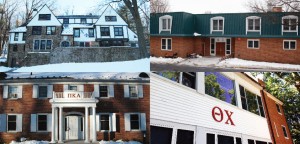
Margaret Burnett, Lisa Ulker, Elissa Miolene/B&W Staff
When Lehigh students go to a party on a Saturday night, they typically cram into off-campus houses, dance and socialize in kitchens and basements. Up the mountain, on top of the Hill are much larger houses where parties can be held. Although they are on campus and more spacious, these Greek chapter houses are rarely used for parties.
After months of conversation, four fraternities hosted registered parties on the Hill on Saturday. Chi Phi, Pi Kappa Alpha and Theta Chi hosted open parties, while Kappa Sigma hosted a closed party. All members of the campus community were allowed to attend the open parties, while only members of a specific sorority or fraternity were allowed to attend the closed party. These parties were part of a pilot program which aims to revamp the social policy on campus.
Matthew Bay, ’16, the Interfraternity Council president, said the Office of Student Conduct & Community Expectiations, the Social Policy Committee, the Office of Sorority and Fraternity Affairs, the Panhellenic Council, the Interfraternity Council and the Lehigh University Police Department were involved with the process.
“This isn’t just an (Office of Sorority and Fraternity Affairs) thing, it’s bigger than that,” said Ashley Baudouin, the assistant dean and director of the Office of Fraternity and Sorority Affairs.
Baudouin said the goal was to create a pilot program that would encourage students to hang out on campus, foster inclusivity and cultivate a healthy social scene.
Parties were held primarily on campus in Greek chapter houses until a few years ago. Baudouin said the social policy itself did not change, but a shift in perception may have occurred.
“If you ask me, I think perception changed,” Baudouin said. “Perception around where was freedom — In terms of where do I not have to manage something? Where can I serve what I want? Where can I do what I want? Where can things be a little crazy? — and that was considered East Fifth, Hillside.”
She said the current social policy can be restrictive and strips most of the responsibility from students. The new pilot policy aims to put more responsibility for managing the event on the host.
One of the biggest differences between the pilot policy and the current social policy is the shift in responsibility of monitoring parties from event staff to students. In years past, event staff, who are people hired by the university to monitor events, had a large role in registered parties held on the Hill. Bay said event staff members stood at the door when students walked in, asked students for identification, wrote down names and gave out wristbands to those over 21 during registered parties.
“But this time all those things that they used to do were now taken over by students, so wristbands, bar duty, that’s all on the fraternities themselves,” said Ellen Weich, ’16, the Panhellenic Council president.
There are now student monitors, and eight Panhellenic and Interfraternity Council executive members monitored parties with two event staff members this past weekend.
“If they walked into a party and saw that something was going wrong, they would say something,” Bay said. “But there’s a big difference between that and having two guys standing in your party watching you.”
Brendan McCullagh, ’16, the vice president of the Interfraternity Council, said the fraternities who hosted parties on the Hill were chosen based on the recommendation of the Interfraternity Council, and the decision was based in part on the proximity of the houses to each other.
After Pike agreed to host a party at its chapter house, a few brothers involved in planning the party were required to attend a meeting with Baudouin and Chris Mulvihill, the assistant dean of Student Conduct and Community Expectations.
Pike’s social chair, Harrison Sommer, ’18, said brothers moved furniture, hired a DJ and tried to ensure the house would be a safe space. During the party, brothers were stationed around the house to monitor hallways, check IDs and bartend.
“Once the party started, it was really just making sure (the Interfraternity Council) and Panhel were happy with how everything was running and fixing any issues,” Sommer said.
To encourage houses to host more registered parties in the chapter houses on the Hill, the cost of hosting these parties has been lowered. Bay said it was $250 for a fraternity to host a party in addition to the cost of party supplies, but now the cost is split among all organizations hosting the registered party that night.
“I think it’s definitely a step in the right direction,” Sommer said. “It’s still a little more expensive (than hosting off campus,) but it’s a lot cheaper than a registered would have been in the past.”
McCullagh said any event with more than 50 people must be registered with the current social policy. With the new policy, an event that has fewer than 75 people does not need to be registered with the school. Bay said a small gathering in a chapter facility, with fewer than 75 people, would not warrant sanctions against the fraternity for having an unregistered event.
McCullagh said a maximum of eight cases of beer were allowed at registered parties in the past, and this alcohol was consumed quickly. There was no case limit this weekend, and the chapter houses determined how much to buy. Bay said this may not be the case moving forward.
The pilot policy only allows for registered parties on Thursdays, Fridays and Saturdays, and Sommer worries students may not support the pilot program because of this.
“They don’t allow anything after midnight on Thursdays and nothing on Tuesdays or Wednesdays, so people would be unhappy about that,” Sommer said. “Aside from that, people in general want less regulation, and obviously the school can’t do that.”
Bay said registered parties will not be allowed on weeknights in an effort to create a healthy drinking culture.
“We don’t need a social policy that allows us to drink six days a week,” Bay said. “That’s not exactly necessary.”
Weich said students may not like the new social policy because they do not like change, but Bay said change is possible.
“There’s no reason change can’t happen in a year,” Bay said. “Change happens in the blink of an eye.”
Bay, Weich and Baudouin said there needs to be a more effective way to check in students to the parties. At the parties on Saturday, student monitors asked to see students’ Lehigh IDs and driver’s licenses and were required to write the name of the student on a piece of paper.
Some of the names that were written were illegible, and other logs showed some students attended multiple parties. This also created a line outside of the houses, and Weich said some students became irritated as they waited outside. Bay said it would be ideal if there were a system where students would swipe their ID and then the name of the student and their age would automatically be put in a spreadsheet.
Although one of the goals of the night was to foster inclusivity among Lehigh communities, not all students felt this was achieved.
“Still it feels kind of weird,” said Rocky Perez, ’18, “since it’s someone’s fraternity house, it kind of feels different.”
Baudoin did not have an exact number of students who visited the open parties on Saturday night, but she estimated it was over 500 students.
“I was anticipating a few hundred (people) throughout the night, but I think we ended up having over 500 people come to the party at one point throughout the night,” Sommer said.
Bay said there were people from different campus affiliations at the parties.
“Initially I’ll call this one a win, but I still think we have a lot of work to do,” Baudouin said.
She anticipates more similar events will be held before the end of the semester.





Comment policy
Comments posted to The Brown and White website are reviewed by a moderator before being approved. Incendiary speech or harassing language, including comments targeted at individuals, may be deemed unacceptable and not published. Spam and other soliciting will also be declined.
The Brown and White also reserves the right to not publish entirely anonymous comments.
2 Comments
Uh huh. Lots of alumni remember when this was routine, right down to the official panhel drinking calendar (I’m sure I can still reel it all off from memory); lots of us also remember when drinking/hazing deaths and sexual assault at the officially calendared parties were also routine on the Hill. (I never really did get over hearing a Lehigh admin tell me that the party deaths were a thing that was just going to happen, boys-would-be-boys style. In retrospect it was probably the voice of a man who’d long since given up trying to get anywhere with higher admin, trustees, panhel, alumni, or some combination of them.) Considering that guys living in these fine chapter houses still reliably turn up in the news on charges of everything from B&E to assault to hate crimes to handing booze to minors, this is a good idea because why, again?
I was a witness to the changing tide, from parties happening at nearly every house on a Saturday night, to nearly zero. I’ll explain in simple terms why that happened.
1. No hard liquor / No kegs on the hill.
2. $250 fee to host a registered party vs. free at your off campus house.
3. Underage drinking. College students are going to drink alcohol. Plain and simple. You can’t host a party with freshman rushes and sophomore brothers when there is Lehigh security at the door and wristbands for the bar.
4. Consequences. This is the big one. Under Alice P. Gast’s reign, houses which hosted ‘unregistered’ parties were quickly and severely punished for it. At one point nearly every house on the hill was under some form of “probation”. Chapters with over 100 years of history were getting disbanded left and right. That’s not a risk most houses were willing to accept.
So parties moved off campus, where dangerous locals mix with intoxicated college students. These registered parties are a token of good faith, but they’re ultimately useless because they don’t solve any of the issues above.
Houses on the hill were designed to host parties. They have large open rooms, with high ceilings, fire suppression systems (sprinklers), well marked exits and accessible bathrooms. In contrast, you’re average off campus house was designed to house Bethlehem Steel workers in as little space as possible. They’re dark and dingy, feature low ceilings, dirty basements, with usually only a single narrow steep staircase. They’re a death trap if a fire were to ever break out.
It can be strongly argued that allowing students of all ages (including freshman) to drink on campus, in fraternity houses is much safer than forcing them off campus. So how does Lehigh do that? As long as the legal drinking age is 21, the university is in a tough position where it cannot sanction these events. What they can do however is lessen the enforcement of these policies, and rekindle the sense of trust that used to exist between Greek life and the university. Unregistered events should be allowed to return to the hill. The university should still retain the security guards or “brownies”, to keep an eye on things and make sure things don’t get out of hand, but if a chapter can demonstrate their ability to safely entertain an open party, then isn’t that better than doing it off campus? If necessary, the police can always step in and shut things down, sending everyone home. Unless evidence presents itself of unsafe activity, the police should allow participants, underage or not, to leave in peace.